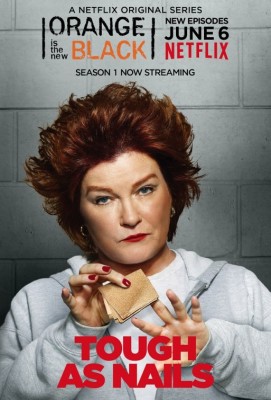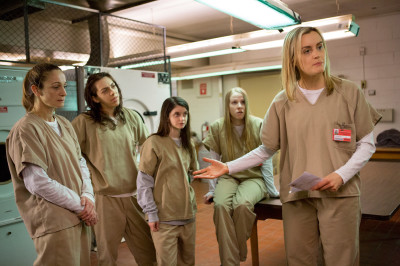Piper Chapman is having an identity crisis.

Chapman (Taylor Schilling), the main character of the Netflix series Orange is the New Black, is a middle-aged upper-class woman who’s just gotten engaged to the man of her dreams. But is this the real Chapman? Or is the real Chapman the wild lesbian from a decade ago who fell in love with drug dealer Alex Vause (Laura Prepon) and once smuggled money internationally for her? Or maybe the really-real Chapman is an inmate at a women’s correctional facility who’s been removed from everything she knows and loves and placed in a situation where she’s totally out of control and has no idea how things function behind bars?
 Which version of ourselves are we? Do we change over time, or do we just act different in different situations around different people? And identity is just one of the major themes of Orange which is one of the best things on TV even if you don’t need a TV to watch it.
Which version of ourselves are we? Do we change over time, or do we just act different in different situations around different people? And identity is just one of the major themes of Orange which is one of the best things on TV even if you don’t need a TV to watch it.
In Orange, Chapman is tried and found guilty of her smuggling a decade ago and is sentenced to 15 months behind bars at a women’s correctional facility. There, Chapman must come to terms with her past decisions affecting her current situation as well as navigate little prisoner fiefdoms and cliques while also trying to maintain her sanity as shes separated from everything she knows and everyone she loves.
A sort of anti-series to the HBO jail series Oz, the prison life in Orange isn’t gory or brutal or even all that dangerous. Prison life for Chapman is everyday degradation that comes from being locked up behind bars and less stabbings in the cells. And while everyone from Chapman to her fiance played by Jason Biggs to the judicial system agrees that if anyone doesn’t deserve to be in prison, it’s Chapman who’s spent the last decade turning her life around, none of this really matters in the maze of bureaucracy that is the US prison system.

Chapman’s life inside prison becomes infinitely more complex when her ex-lover Vause is sentenced to serve time alongside her in the same prison. The question for Chapman becomes can she stay true to her identity on the outside with a loving fiance waiting for her once she’s released or will she turn back to her old, wild days and find comfort with Vause on the inside?
While a lot of other series have tried to work flashbacks into their storylines, Orange is also the first series since Lost to actually do flashbacks right. Here, character backstories are sketched out as we get to see exactly what landed some of the ladies behind bars. Some of the inmates are inside for making bad decisions or following the wrong people. But as Orange progresses and we see more and more of the character backstories it soon becomes apparent no one is who we think they are. Be it the seemingly gruff cook Red, played by the wonderful Kate Mulgrew, or the misunderstood to downright dangerous ‘Pennsatucky’ Doggett (Taryn Manning).
All this is very heavy territory to cover in a genera previously known for being a exploitation fodder used as an excuse to show soapy nude women in showers and catfights between said women in said showers.

Orange is the opposite of all that. It delves deeper into the lives of the inmates and shows that they’re all real people, with real lives and problems. With each just wanting to get out of prison, even if in reality some who try the hardest to get out won’t be getting out to good situations and will be back inside withing a matter of months.
The entire first and second seasons of Orange is the New Black are available on Netflix. The book of the same name the series is based on is also available.
